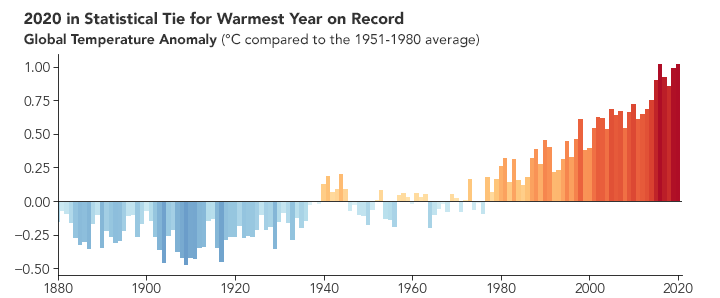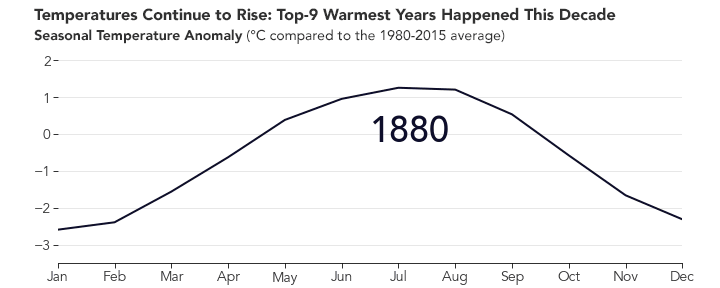Globally, 2020 was the hottest year on record, effectively tying 2016, the previous record. Overall, Earth’s average temperature has risen more than 2 degrees Fahrenheit since the 1880s. Temperatures are increasing due to human activities, specifically emissions of greenhouse gases, like carbon dioxide and methane.NASA's press release, 2020 Tied for Warmest Year on Record, NASA Analysis Shows, stated the conclusion more explicitly.
Earth’s global average surface temperature in 2020 tied with 2016 as the warmest year on record, according to an analysis by NASA.The version at NASA's Earth Observatory added in its version of the press release, 2020 Tied for Warmest Year on Record.
Continuing the planet’s long-term warming trend, the year’s globally averaged temperature was 1.84 degrees Fahrenheit (1.02 degrees Celsius) warmer than the baseline 1951-1980 mean, according to scientists at NASA’s Goddard Institute for Space Studies (GISS) in New York. 2020 edged out 2016 by a very small amount, within the margin of error of the analysis, making the years effectively tied for the warmest year on record.
“The last seven years have been the warmest seven years on record, typifying the ongoing and dramatic warming trend,” said GISS Director Gavin Schmidt. “Whether one year is a record or not is not really that important – the important things are long-term trends. With these trends, and as the human impact on the climate increases, we have to expect that records will continue to be broken.”
The bar chart below shows this year in the context of the past 140 years in the modern temperature record. The values represent surface temperatures averaged over the entire globe for the year.

The NASA Earth Observatory press release continued.
Tracking global temperature trends provides a critical indicator of the impact of human activities—specifically, greenhouse gas emissions—on our planet. Earth’s average temperature has risen more than 1.2 degrees Celsius (2 degrees Fahrenheit) since the late 19th century.Based on all these analyses, declaring 2020 a statistical tie with 2016 looks like a safe conclusion to me.
A separate, independent analysis by the National Oceanic and Atmospheric Administration (NOAA) concluded that 2020 was the second-warmest year in their record, behind 2016. NOAA scientists use much of the same raw temperature data in their analysis, but have a different baseline period (1901-2000) and methodology. They noted that 2020 was the 44th consecutive year with global land and ocean temperatures above the 20th-century average.
Scientists from Europe’s Copernicus program also have 2020 tying 2016 as the warmest year on record, while the UK Met Office ranked 2020 as the second-warmest.
NASA Earth Observatory's press release included one more graphic I want to share.
The animation below shows the seasonal cycle in global temperature anomalies for every month since 1880. Each line shows how much the global monthly temperature was above or below the global mean of 1980–2015. These seasonal anomalies are drawn from the Modern-Era Retrospective analysis for Research and Applications, version 2 (MERRA-2), a model run by NASA’s Global Modeling and Assimilation Office.

Talk about a picture being worth 1000 words! That clearly shows how much warming has taken place over the past 140 years!
I have one last excerpt to share.
While the long-term trend of warming continues, a variety of events and factors contribute to any particular year’s average temperature. The largest source of year-to-year variability in global temperatures typically comes from the El Nino-Southern Oscillation (ENSO), a naturally occurring cycle of heat exchange between the ocean and atmosphere. While the year ended in a La Niña (cool) phase of ENSO, it started in a slightly positive (warm) phase, which marginally increased the average overall temperature. The cooling from the negative phase is expected to have greater influence on 2021.Yikes!
“The previous record warm year, 2016, received a significant boost from a strong El Niño,” Schmidt said. “The lack of a similar assist from El Niño this year is evidence that the background climate continues to warm due to greenhouse gases.”
Follow over the jump for what 2020's record warmth meant for last year's weather plus the footnote showing Thunberg's tweet.
NASA Goodard connected 2020's record average high global temperature to last year's weather in A Look Back: How Heat Shaped 2020.
By most accounts, 2020 has been a rough year for the planet. It was the warmest year on record, just barely exceeding the record set in 2016 by less than a tenth of a degree according to NASA’s analysis. Massive wildfires scorched Australia, Siberia, and the United States’ west coast – and many of the fires were still burning during the busiest Atlantic hurricane season on record.That went into even more depth about 2020's global weather-related disasters than I did last year, as I looked more at the reactions to the Australian fires than I did to the fires themselves and I didn't cover the "zombie fires" in the northern forest and tundra.
CBS News described last year's economic losses in U.S. breaks record for billion-dollar weather and climate disasters in 2020.
2020 tied the record for the warmest year on record, and the world also grappled with historic wildfires and hurricanes. The U.S. saw an unprecedented 22 disasters with damages of $1 billion or more. CBS News meteorologist and climate specialist Jeff Berardelli joins CBSN to explain.That's another video I can show to my students. Welcome to blogging as professional development.
*Here's her tweet.
Since Thunberg's birthday was last week, I'm dedicating this post to her as a late birthday present. A belated happy birthday to you, Greta!This news is neither abstract, far into the future, irrelevant nor hard to understand - which are the usual excuses for not covering the climate emergency.
— Greta Thunberg (@GretaThunberg) January 15, 2021
And yet it's not dominating the news. In fact it barely gets a mention. This is an active choice that sends a clear signal. https://t.co/chZvicsZYo
No comments:
Post a Comment